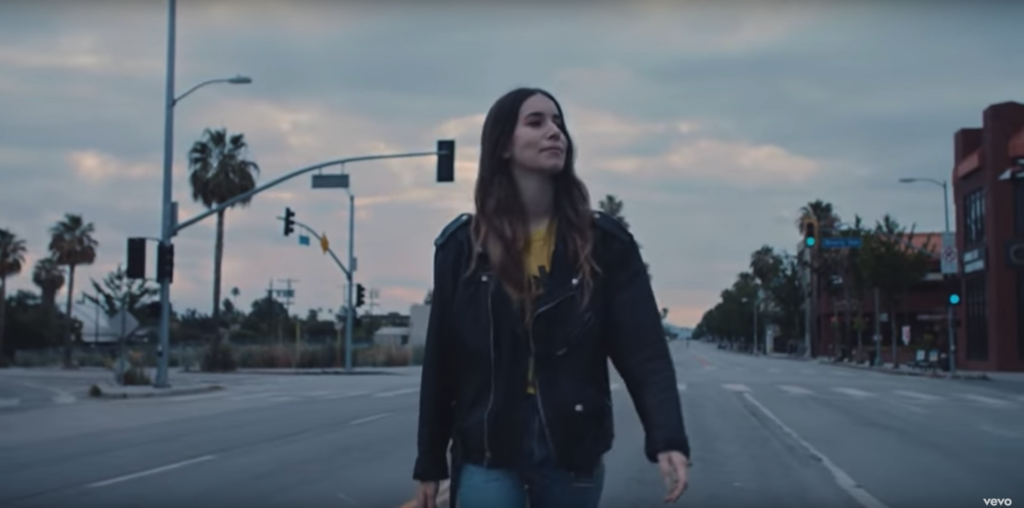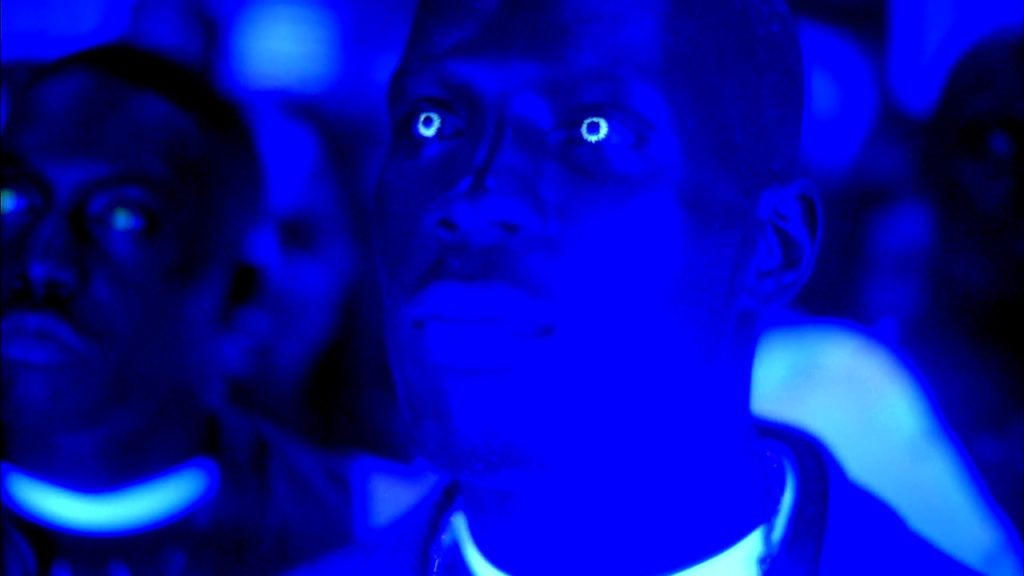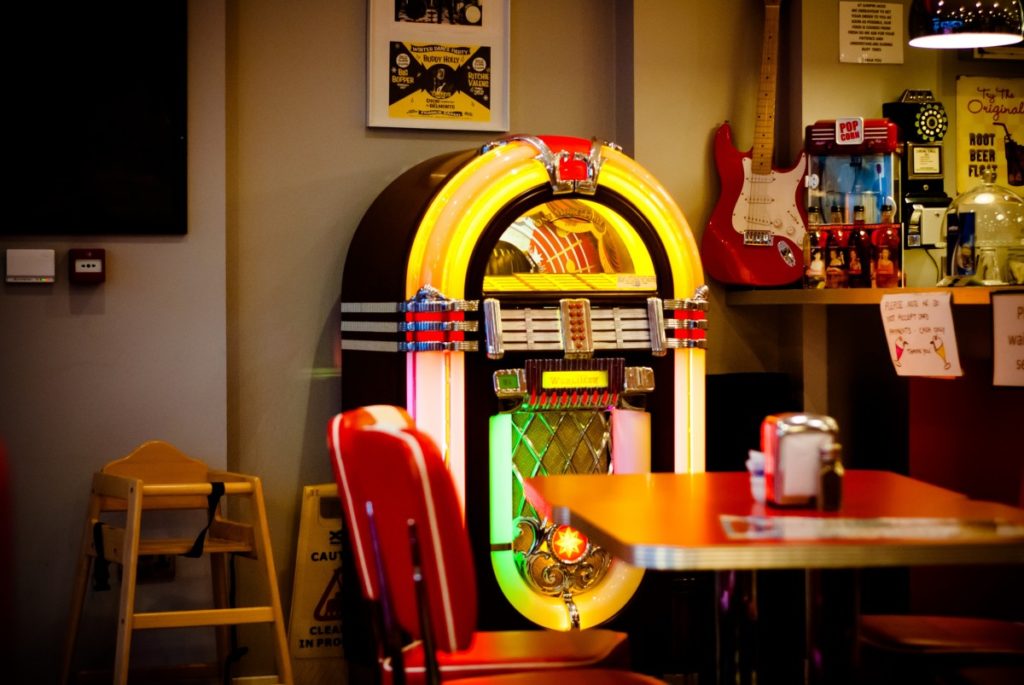Tambourine Tambourine You Are My Friend We Shall Make Music Again
Notes on Pop
On Breakups
ByHanif Abdurraqib'south monthly cavalcade, Notes on Pop, muses on the relationship between songs and retentivity. Read more here.

All the same from HAIM'southward "Want Y'all Back"
During my arts and crafts talk about poems and sound, I play small parts of songs or music videos. I'm giving away the secret here, only it'south to distract from the fact that I don't know what I'thou talking nearly. Or, I do know what I'm talking about, but I can't articulate it in any way that makes sense outside of the hamster bike of my own brain. In some spaces, in that location is the assumption that anyone who writes poems wants to talk near the writing of them in front of people, and is equipped to do and then. Only some of us are just fumbling around dark rooms, occasionally lucky plenty to find a light switch. And and then, to not requite away my fumbling, when I give a craft talk, I play songs. I play spirituals and gospel, and I play the rap songs that have sampled the spirituals and gospel. To talk about the magic trick of pace—of suggesting a large moment only to later reveal an even bigger moment—I play the iconic video of the Who performing "Baba O'Riley." The one you've maybe seen, where the intro swells and swells until it feels like it could fill an entire stadium, and you might recollect, How tin can nosotros ever climb atop this? But then Pete Townshend tosses his tambourine, steps back from the microphone, and windmills his arm effectually his guitar and shakes his donkey in white pants while Roger Daltrey holds a microphone to the heavens with both easily.
Merely commencement, I play HAIM's "Desire You lot Back." A specific part, effectually the ii:twenty mark. All of the instruments drop out for about xv seconds and all that remains is the layering of voices, singing out "merely know / that I want you / dorsum" before the drums enter and the vocal rebuilds itself from the vocals upwards. In the talk, the signal is most silence, I recall. Or the indicate I'k trying to make is most how the vocalisation itself isn't the instrument. That language is the musical instrument and voice is just the vehicle, similar a speaker or an amplifier. The point is almost silence and the things we deem equally percussion. How, along the landscape of silence, any audio that interrupts can be percussive. I make the betoken by pulling up a poem that has one word drowning in the otherwise white space of a folio. That's percussion, I say. In the poem "Katy," Frank O'Hara writes, "I am never quiet / I mean silent," and I assume people who take been lone enough or isolated plenty know the departure. Percussion tin can be even the gentlest interruption. Here'south a physical instance I give: two people on the phone, near the end of a conversation, when the line betwixt them falls into the depths of soundlessness. Even one person saying the words "I love you" is percussive. All our affections, coming on the backs of drums.
Read More
Notes on Pop
On Warnings
Past Hanif Abdurraqib 
Nevertheless from Belly (1998)
It is hard to say when I stopped noticing the sirens. They're still there, piercing the otherwise normal Wednesday-afternoon noise. But I haven't noticed them for at to the lowest degree fifteen years. In the cardinal Ohio surface area, a test of the state's tornado-siren organisation takes place every Wednesday at apex. I would describe the audio for you, but even now I can barely remember it. I recall information technology outset as a depression whistle that bends into a loud howl, but the sound feels distant to me now. It's indistinguishable from all the other ways this metropolis rumbles its way toward productivity.
When I was a kid in simple school, I causeless the siren tests happened everywhere. Twice a month, at noon, when the howling began to announce itself, all of us kids spilled into the hallway, and sat on our knees facing the wall. Nosotros'd lock 1 of our hands into the other, put them backside our heads, and curl ourselves downward. It was practise for the actual tornado, which we were told might come at whatsoever moment. It might come while nosotros were in our classrooms learning whatever it is unproblematic school kids learned in the nineties (yet another thing I don't remember). I never knew this was something exclusive to my school, or schools in my expanse. I imagined an entire chain of balled-upward bodies, trembling against walls in school hallways across the country.
Once I hit my early teenage years, when tornado rehearsals were no longer required of me, my ears stopped registering the sirens. Most people who take lived in primal Ohio for long plenty echo this sentiment. Nosotros know the sirens only past those around us who oasis't been here long. The way they jump, or their optics widen as they await to the sky, expecting chaos. That's when I hear the racket again.
Read More
Notes on Pop
On Summer Burdensome
Past Hanif Abdurraqib 
Whitney Houston in 1991
Friends and heartthrobs of the past, hereafter, and nowadays: where I am now, the temperature has begun its slow climb, and summertime is preparing its eviction find for all the gentle breezes and drives with windows downwardly and the ceaseless joyful choir of birds. We will soon have to settle for less pleasing aesthetics of romance. Sweat becomes romantic because it will happen whether or not I desire information technology to, and I've got to brand the all-time of it. During summer in Ohio, the storms come briefly, simply violently, and seemingly out of nowhere. The sun will exist out as you make your way to the car, but by the time y'all arrive at your destination, you lot're trapped in a parking lot with torrents of rainwater collapsing on your windshield. I think I would like to call this moment romantic, too, for all the times I've sat outside of a grocery shop, or a bar, or an ice cream shop, turning up a song that reminded me of someone in hopes that the music and the retention might intersect and silence the downpour.
It is a privilege to have seasons. Sometimes, in Columbus, Ohio, we don't become much of jump. Winter digs its claws in and so information technology'due south all of a sudden eighty-5 degrees with suffocating humidity. The planet, of grade, may non afford me many more years like this ane. One where I've been blessed with a distinct turning over from one season to the next. I like it this style, existence gently shepherded through, as opposed to dropped in the heart of a landscape already in progress. It is hard to create longing without the reminder of what we're longing for.
Speaking of longing, I am here to one time again consider the moment in the pre-chorus of "How Will I Know," which creeps underneath the vocal's ecstatic and bombastic uncertainty. Whether intended in the original message or not, this was the outset vocal that most clearly articulated the anatomy and anxiety and secret pleasures of a crush. While Whitney drags out the words of the song'south central question as merely Whitney can, the backup vocals trickle in with "don't trust your feelings," which is the moment that feels the almost true to the real-life conundrum. A person, shaky, but fantasizing toward confidence while, underneath, their friends attempt to whisper them back to reality.
Read More
Notes on Pop
On Nighttime
By Hanif AbdurraqibHanif Abdurraqib's new monthly column, Notes on Popular, muses on the human relationship between songs and retention.

Source: Thinkstock
I discover myself near aware of silence when I am thinking near the many means it can be punctured. Under the wrong circumstances, a hospital room can become a symphony of noises, each of them courting the worst of a person'southward anxieties. There might exist an incessant just inconsistent beeping, or the sounds of several machines doing the work of keeping a person live. Information technology is a privilege to be told that someone you honey is going to survive. The message comes from some exhausted doctor, eager to give the proficient news later the tests, or the surgery, or whatsoever else. I have likewise been on the other side: knowing that I would be watching a person I love slowly fade until they vanished birthday, and understanding in that location's nothing that tin can be washed.
There'due south something uniquely challenging well-nigh the moments in between, when the good news of a person'due south continued living is delivered, but they withal take to stay in a hospital room for a few more days earlier they can go habitation. From far enough away, underneath a wave of monochromatic infirmary blankets, it can be hard to tell if someone is still breathing. Particularly if y'all've already imagined a earth without them in it. If you've spent enough time imagining someone as dead, it tin be difficult to visualize them as simply sleeping. I don't beloved hearing the beeping and the sonic hiccups of infirmary mechanism, but it is worse non to hear annihilation.
Read More
Notes on Pop
On Believing
By Hanif AbdurraqibHanif Abdurraqib'due south new monthly column, Notes on Pop, muses on the human relationship betwixt songs and memory.

To begin with a fact that is entirely beside the point (unless yous are the owner of a Michigan area code and a very particular type of pride): S Detroit is, in fact, not a existent place, at to the lowest degree non within the flimsy geographical construct of the United States. Anyone offset in Detroit and traveling s will, considering of how the borders are fatigued, end up in Canada. From a geographical standpoint, S Detroit is Windsor, Ontario.
The eatery S Detroit, which is in Windsor, Ontario, was opened by someone with a slick sense of humor and a precipitous eye for nostalgia and aesthetics. Since we are encumbered with borders, it must exist said that there are a lot of practiced reasons to travel to a border and then cross it. From Columbus, Ohio, where I grew up, the bulldoze to Windsor, Ontario, is almost four hours. Three and a half if you condone the speed-limit signs posted along Road 23, where there are no bluish-and-whites hiding along the high grass, and even if in that location were, they wouldn't cartel film on their sirens and interrupt their downtime, reclining along the road. My friends and I would make the trip to go to the South Detroit diner in Windsor—passports and all. We'd wait in the long line clogging upward the span to another country. The food at the diner wasn't at all spectacular, and my pal Kyryn claimed they didn't know how to mix a good cocktail—I don't know much almost drinks, so I took her at her word.
What S Detroit did have was a good jukebox. I like a jukebox that requires labor. I'k not aging into one of those fist-shaking olds who sits on a porch and bemoans the fact that kids these days don't play outdoors or that people stare at their phones or any else gets said about the younger generations. But there is the fact that I prefer a jukebox, i that cannot be controlled by a phone. I believe in accountability everywhere, even every bit it so eagerly escapes much of our day-to-day lives. And then, I must enquire for accountability at the jukebox, where people know what songs I've played, because they've watched me arroyo the auto and fumble for my coins and roll through the options. They've watched me sit down back down and glance eagerly at the automobile as each vocal ends, if they're watching closely. If they keep watching, they might see a half-smile spring from the edges of my oral fissure when the first notes of my melody arrives. The jukebox alone is but a vehicle for sound, aforementioned as any other. But when a person enters, they tin can adhere themselves and whatever hopes they have for the night, to that vehicle, and information technology becomes something greater. Read More
Source: https://www.theparisreview.org/blog/columns/notes-on-pop/
Belum ada Komentar untuk "Tambourine Tambourine You Are My Friend We Shall Make Music Again"
Posting Komentar